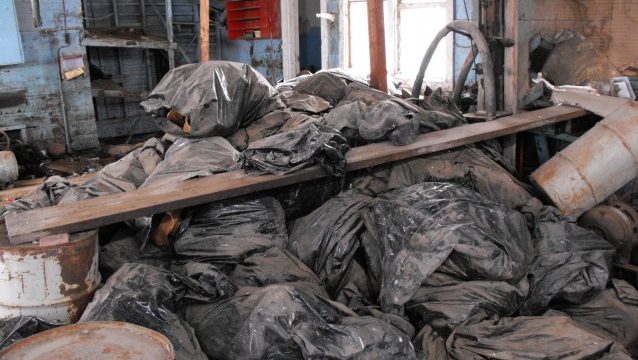Strict Regulations Share Some Blame For Radioactive Waste Dumping In North Dakota

“Radioactive Waste Is North Dakota’s New Shale Problem”
That’s what the Wall Street Journal is reporting in a front-page story, referring to instances of illegal dumping of filter socks in western North Dakota. That dumping includes a high-profile and very troubling instance where an abandoned gas station was found stuffed full of radioactive filter socks, and is the latest in the bi-annual parade of oil patch horribles North Dakotans are treated to by the media and minority party politicians in election years.
The socks, it’s worth mentioning, pose no immediate danger to those around the dumping site. Despite some of the hype in the media, the radioactivity is so low in the socks that they could effectively be blocked with a piece of paper. You’d have to put your face in the socks and breathe in before you’d be at risk of any health ramifications from them. “The site does not pose danger to the public as long as they don’t go into the building and handle the filter socks,” Scott Raddig, Director of Waste Management for the North Dakota Department of Health, told me in an email last month.
The radioactivity they are imbued with is naturally occurring, of the sort you’d find from digging a water well or a basement for a house.
But hyperbole about “radioactive waste” aside, there is really no excuse for this sort of pollution. And it is pollution.
In response to the dumping problem, the state has cracked down. The North Dakota Industrial Commission, through its Department of Mineral Resources, is now requiring sealed and leak-proof containers at drilling sites to contain these socks. The containers must be serviced by credentialed waste haulers. DMR inspectors, who visit the sites every couple of weeks, will be making sure the socks are disposed properly. Those caught disobeying the regulations will face penalties of as much as $12,500 in fines per day.
But there’s a larger problem that has likely prompted much of this illegal dumping. State regulations on disposing of radioactive waste are so stringent, these socks can’t be safely and lawfully disposed of anywhere in North Dakota. The state has a prohibition on disposing of anything in the state that has a radioactive reading of more than 5 picocuries. Any waste measuring above that threshold must be taken out of state.
Since pretty much all of the filter socks produced by drilling in the North Dakota oil fields is above that absurdly low threshold, it all most be hauled out of state. And some bad actors have chosen to dump the waste illegally rather than pay to have it hauled and disposed of legally.
According to Raddig, “Background readings at the [Noonan] site were approximately 8 microcuries/hr. Reading of the trash bags filled with the filter socks were in the range of 40 microcuries/hr., which is still a very low reading.”
That is a very low reading, but because of the state’s strict regulation on radiation, it must be hauled somewhere else.
That needs to change, and it appears as though a change is in the works. The state has commissioned a study from the Argonne National Laboratory to determine whether or not the radiation limit can be raised, thus allowing the lawful and safe disposal of waste in North Dakota.
Such a change in policy would benefit the oil/gas industry and North Dakota citizens alike. The industry gets easier access to lawful and safe waste disposal, and citizens see less waste illegally dumped.
It’s a win-win.
As is often the case, it seems the best government response to this problem is less government.




